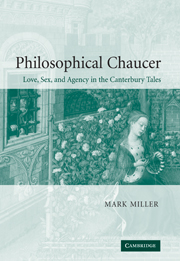Book contents
- Frontmatter
- Contents
- Acknowledgments
- Introduction: Chaucer and the problem of normativity
- Chapter 1 Naturalism and its discontents in the Miller's Tale
- Chapter 2 Normative longing in the Knight's Tale
- Chapter 3 Agency and dialectic in the Consolation of Philosophy
- Chapter 4 Sadomasochism and utopia in the Roman de la Rose
- Chapter 5 Suffering love in the Wife of Bath's Prologue and Tale
- Chapter 6 Love's promise: the Clerk's Tale and the scandal of the unconditional
- Notes
- Bibliography
- Index
Chapter 6 - Love's promise: the Clerk's Tale and the scandal of the unconditional
Published online by Cambridge University Press: 22 September 2009
- Frontmatter
- Contents
- Acknowledgments
- Introduction: Chaucer and the problem of normativity
- Chapter 1 Naturalism and its discontents in the Miller's Tale
- Chapter 2 Normative longing in the Knight's Tale
- Chapter 3 Agency and dialectic in the Consolation of Philosophy
- Chapter 4 Sadomasochism and utopia in the Roman de la Rose
- Chapter 5 Suffering love in the Wife of Bath's Prologue and Tale
- Chapter 6 Love's promise: the Clerk's Tale and the scandal of the unconditional
- Notes
- Bibliography
- Index
Summary
Throughout the history of its modern critical reception, the Clerk's Tale has been marked by a powerful but obscure sense of scandal. It is not hard to see why. The Clerk's story of Walter and Grisilde is that of a wife's unconditional love for her husband which compares her loving virtue to various models of Christian heroism such as Abraham, Job, Mary, and even Christ. But the husband she loves is a paranoid despot who puts her through the most terrible trials, leading her to believe that he has ordered their children killed and finally ejecting her from the palace and staging a fake wedding to a new bride, all to see if there are in fact conditions under which her love for him might come up short. In such a context, the very idea of unconditional love begins to look tarnished, by its seeming indistinguishability from sheer subjection, by its fueling of sadistic hunger, by the implication of that subjection and hunger in the nastiest of gender politics, and by the sheer ugliness of what gets done in its name.
Some critics have insisted that any such reaction to the tale is nothing more than an anachronistic projection of modern concerns on to the text, fueled by a failure to appreciate the Christian ideals to which the Clerk adheres.
- Type
- Chapter
- Information
- Philosophical ChaucerLove, Sex, and Agency in the Canterbury Tales, pp. 216 - 248Publisher: Cambridge University PressPrint publication year: 2005
- 2
- Cited by

